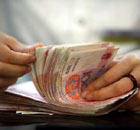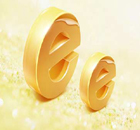Top Stories
Warning on Kobe beef ruins some appetites
By Lu Chang (China Daily)
Updated: 2010-05-05 08:14
 |
Large Medium Small |
Lovers of Japanese cuisine, especially its famed Kobe beef, have expressed amazement after learning the prized delicacy is banned in China.
Many people were unaware of the prohibition before a China Central Television (CCTV) report on Tuesday exposed the fact that the beef, which has been readily available in the Chinese market for years, had been blacklisted by the Chinese government since an outbreak of mad cow disease in 2001.
At least 46 restaurants in Beijing now claim to sell Kobe, which is known for its highly marbled texture and tender taste. The restaurants are either illegally importing it or passing off domestic beef as the real thing, said CCTV.
Hu Xin, a 28-year-old regular at Japanese restaurants, said she didn't know the beef had been forbidden and was being imported and served in Japanese restaurants without permission and rigorous testing.
"I have eaten Kobe beef for a long time because of the special flavor and tender taste," she said. "Even though the price is 10 times higher than normal beef, I have always thought it was worth the price because it's very good for your health.
"But I felt so worried after I found out the truth. I will definitely not go to a Japanese restaurant again to have beef."
A customer at a Japanese sushi restaurant in Chaoyang district said that while she doesn't eat Kobe beef, she was worried about those who do.
"Customers are easily cheated by sellers who will do anything to make a profit," she said. "I think we should be very cautious when we are spending our money."
Yang Qian, a waitress at the Red Triumphal Arch Hotel, said Kobe beef can only be produced in Japan because of the specialized climate.
In a typical restaurant, Kobe beef sells for about 328 yuan for 100 g.
"We have really good Kobe beef," said another waitress at a restaurant. "It is said that the cows are massaged in sake by milk maids and are fed with beer in the summer. Such practices help relieve the cattle's stiff muscles and that makes the beef so tender."
Qiu Baochang, a counselor with China Consumers' Association, was strongly opposed to restaurants illegally importing Kobe beef because it would not have been examined by food safety officials, breaking the food safety law.
"People shouldn't buy Kobe beef. Not only does it cost too much, but it is very unhealthy," Qiu said. "I think relative supervision and regulation departments should make a move on that, so that consumers have no need to worry about it."







